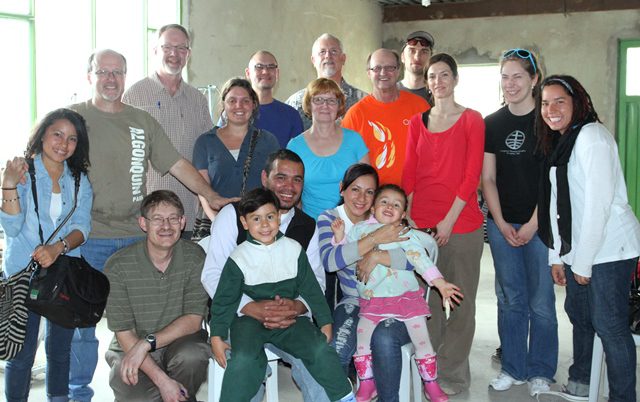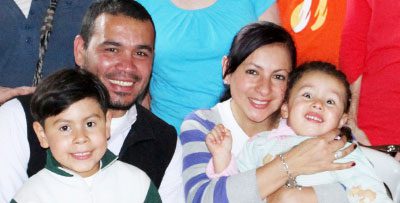Every morning, our group piles into a van that drives us to the MCC Colombia office. Every morning, we laugh in disbelief at the way traffic flows: steadily moving bumper to bumper through streets with lines that act, at most, as suggestions. Someone describes this movement as “guided by relationships rather than organized by rules.” In Colombia, relationships are not mediated by law.
We travel to Cazucá, a shantytown in Soacha, on the outskirts of Bogotá to visit David Bonilla and his wife Marina at their Mennonite Brethren church. Other churches and NGOs are active in and around Cazucá, but only David and Marina live there.
We wait at the bottom of the hill for David to accompany us for the last quarter mile even though the weather is comfortable and the church is close. Later, we are told the neighbourhood is dissected by invisible lines that mark gang territories.
Sanctuary
The entrance to the church opens onto a patio teeming with playing children. They are gorgeous. The tin roof vibrates with their animation and we revel in it. They play with broken toys. One child, doing an army crawl, pretends he’s playing with an object that explodes in his hands. We’re told these are the younger kids; the older ones play later so they don’t hit the younger ones. This, of course, is common to all children. But here, it’s chilling.
David guides us through the labyrinthine structure to the sanctuary. We see rooms for different projects: a sewing room where women make clothes; schoolrooms for the children; a room with a few computers and a keyboard.
The story of how David came to Cazucá centres on a local woman whose body was riddled with cancer. Her husband abandoned her in fear of catching it. David read the Bible with her, and neighbours noticed his recurring presence.
No other pastors come here; people are perplexed. They tell him he’s crazy. “It’s by being crazy we built all of this,” he retorts.
 The craziness of Colombia itself is palpable, but difficult to describe – hence we tell stories. Paramilitaries (paras) bring both violence and protection: their presence enables the church to function, but their law is imposed through selective assassinations that David is trying to stop. Women whose husbands have been killed (most likely by the paras) work from 3 a.m.–10 p.m., leaving their children either on the streets to be recruited by gangs or locked in their houses getting so hungry they eat toothpaste.
The craziness of Colombia itself is palpable, but difficult to describe – hence we tell stories. Paramilitaries (paras) bring both violence and protection: their presence enables the church to function, but their law is imposed through selective assassinations that David is trying to stop. Women whose husbands have been killed (most likely by the paras) work from 3 a.m.–10 p.m., leaving their children either on the streets to be recruited by gangs or locked in their houses getting so hungry they eat toothpaste.
When one of the MCC Seed workers* describes the violence – rape, murder, thieving, drug trafficking – David shakes his head. It’s crazy. Yet, David does not have the world-weariness you see in pastors burnt out by tiresome demands of congregations in Canada.
No explanation
Reason fails in Colombia: none of the stories lead to an explanation or reveal an underlying reason for the way things are. Our tour of Cazucá can be given in a sequential order: the hanging tree where people are executed, the brown door behind which drugs are trafficked, the rose garden, the dogs barking, the blood splattered in the dirt, the resourceful families, the smiles and greetings, the man with scars on his face, the woman whose stew David describes as “finger licking good.”
What connects them? Each is its own Rorschach test: make of it what you will. For a tourist such as myself to say that there is a dignity and happiness in the people we meet (which Marina insists upon) that blots out the despair and redeems the gut-wrenching tales would be patronizing at best.
What I can say is that David and Marina have embraced the insanity by refusing to despair in a world in which communal life is not organized by laws. Neither the government nor violence makes sense or enforces order; instead, David and Marina form relationships that exceed social boundaries. These church planters incarnate Colombia’s craziness in their profound inter-involvement with both marginal and powerful lives.
People in the community don’t go to David and Marina out of guilt or shame, but because they are looking for a new life, an encounter with God.
 As a Canadian, I’m tempted to react to horrific stories with guilt and shame. But to feel only guilt and shame would not recognize, and therefore forestall participation in, the complex craziness that built an MB church in a place all others flee after sunset. It would give our transgressions the last word. Like Colombia, we are free from the law, which gives both love and hate incomprehensible fertility.
As a Canadian, I’m tempted to react to horrific stories with guilt and shame. But to feel only guilt and shame would not recognize, and therefore forestall participation in, the complex craziness that built an MB church in a place all others flee after sunset. It would give our transgressions the last word. Like Colombia, we are free from the law, which gives both love and hate incomprehensible fertility.
While resources are needed, what is of utmost importance, David and Marina say, is that we pray for them. Their lives and mission are sustained in part by our encounters with God, by a continual search for new life radically present in community.
This is not sentimental or simplistic. When laws do not organize our churches (rules that tell us who our friends are, who we can worship with, who we listen to), then they are guided by relationships with our communities – which is crazy.
—Joe Wiebe is a member of Grantham MB Church, St. Catharines, Ont., and adjunct instructor at McMaster University, Hamilton, Ont. At the invitation of the local Mennonite Brethren church, he participated with seven other Canadian MB church leaders in a Mennonite Central Committee learning delegation to Colombia Mar. 4–15. A version of this article first appeared at mennocolombia2013.wordpress.com.
* Seed is a two-year program of Mennonite Central Committee that focuses on connecting young adults from different places to learn, serve, and advocate.

Learning tour participants, MCC Colombia staff and Seed workers, and David and Marina Bonilla.
Read all blog entries:
Colombia Mennonite Brethren invite Canadian MBs to visit
“I am convinced that, hearing their stories of planting churches and sharing the gospel in contexts of poverty, injustice and conflict, will inspire us to greater faithfulness to Jesus’ good news.”—César García, MWC general secretary
Mining and Resource Extraction in Chocó, Colombia: Pillage, Destruction, Violence and Misery
“Our role as Mennonite Brethren church is to accompany and guide both our members along with the community at large to develop mining activities responsibly and with social justice, with the understanding that God has placed us as administrators of creation with the responsibility of using natural resources rationally and intelligently.”—by José Rutilio Rivas Domínguez, pastor, Mennonite Brethren Church of Chocó, Colombia
An inspirational first day: day 1
“I asked Alejo where he found hope and joy. He responded that it was witnessing the Spirit-led creativity of Christ’s community on the ground in small otherwise undetectable ways: community processes that neither the university nor the seminary could have foreseen or imagined but brought about by the Spirit of God.”—Ken Peters, pastor, Saanich
Finding Gold in Colombia: day 1
“Meeting members of my global Anabaptist family in Colombia today, face to face, was finding gold in a relational vein that has been untapped for far too long.”—David Esau, pastor, Eagle Ridge
One size doesn’t fit all… Day 2
“Our faith journeys…are lived realities, walked within the context of our unique personal, communal, national, and even global stories. In Colombia, this means wrestling with faith in a context where struggle is no stranger—where human rights abuses are systemic, economic inequality abounds, and various government forces, paramilitaries, and guerrilla groups create devastating insecurity and displace Colombians in mind-boggling numbers.”—Jenn Wiebe, policy analyst, MCC Ottawa
Shaped by a history of violence: Day 2
“Due to the longstanding history of Mennonite Brethren presence and ministry of coming alongside the marginalized and the most vulnerable, the government recognizes the Mennonite Brethren and Mennonite contribution to community development and to their legacy of being non-partisan peace-builders.”—Dave Chow, pastor, Killarney Park
Hope in Cazucá: Day 3
“We were deeply moved (and for many of us to tears) by what we experienced in this holy visit with these saints. David and Marina exemplify a life that is devoted to listening to and following Jesus.”—Gerald Hildebrand, pastor, McIvor Avenue
My heart is full: Day 4-5
“It was a blessing to meet with pastors from all over Colombia, worship with them, and hear of their joys and struggles. It is amazing to see and hear how God’s people are being salt and light – both which enhance their object. The people are showing Jesus to the world.”—Dan & Carol Siebert, Main Centre
Know Hope In Colombia: Day 4-6
“And if you could hear what we have heard, seen what we have seen with our eyes, what we have looked at and our hands have touched, you would know hope in Colombia too.”—David Esau, pastor, Eagle Ridge
The Lord Reigns in Istmina: Day 6
“To suggest the Chocóan MBs are resilient is an understatement. Their creativity and hope enables them to eke out lives of dignity contrary to all powers working against them.”—Ken Peters, pastor, Saanich
Weaving Hope: Day 7
Pastor Rutilio said “Mennonite churches have been committed to nonviolence and peace-building for centuries. We will not support any armed groups, not even the State Armed Forces.… We will not support you, even if it costs us our lives.”—David Esau & Dan Siebert
Naive Wandering: Day 8
“We are often naively unaware of the danger we may be in when we wander in isolation from relationships with our global sisters and brothers.”—Gerald Hildebrand, pastor, McIvor Avenue
Clear and Present Danger: Day 10
“In our life and work we often search out and stumble upon people and organizations that inspire us – we are drawn to admire and even more to emulate them. In Colombia we found examples to model our own life after: to follow them as they follow Christ.”—Ken Peters, pastor, Saanich
Experiencing the Delegation from the Other Side
“From day one, delegates were asking each other, and the Colombians they were encountering, the tough questions – looking to discover Canada’s connections, both good and bad, to Colombia, as well as thinking constantly about how they could encourage and receive encouragement from our Colombian brothers and sisters in Christ.”—Rebekah Sears, MCC Colombia
